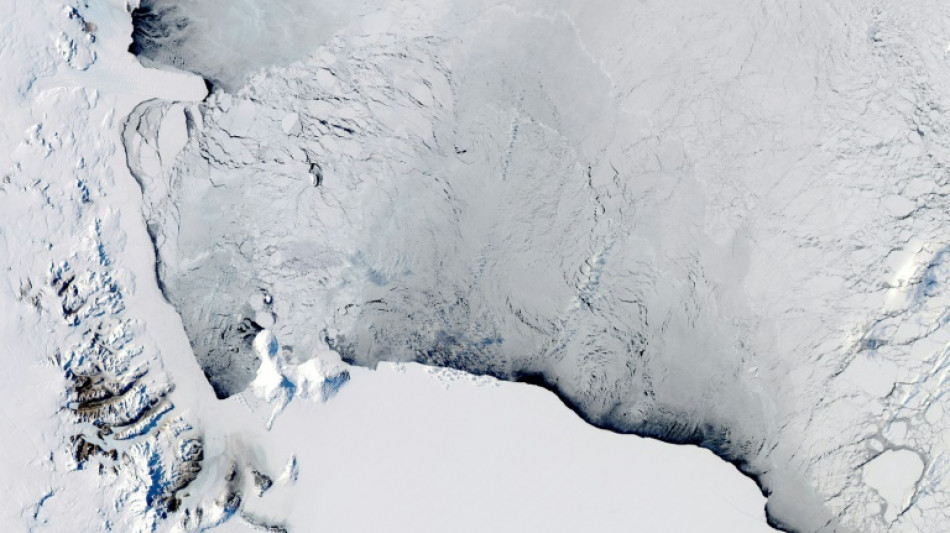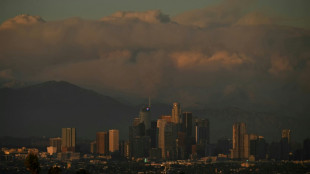
-
 Japan's Panasonic targets 10,000 job cuts worldwide
Japan's Panasonic targets 10,000 job cuts worldwide
-
Putin evokes WWII victory to rally Russia behind Ukraine offensive

-
 China exports beat forecasts ahead of US tariff talks
China exports beat forecasts ahead of US tariff talks
-
Leo XIV, the 'Latin Yankee', to celebrate first mass as pope

-
 Most stocks lifted by hopes for US-China talks after UK deal
Most stocks lifted by hopes for US-China talks after UK deal
-
IPL suspended indefinitely over India-Pakistan conflict: reports

-
 German lender Commerzbank's profits jump as it fends off UniCredit
German lender Commerzbank's profits jump as it fends off UniCredit
-
Rare bone-eroding disease ruining lives in Kenya's poorest county

-
 India says repulsed fresh Pakistan attacks as de-escalation efforts grow
India says repulsed fresh Pakistan attacks as de-escalation efforts grow
-
Zhao's historic snooker title sparks talk of China world domination

-
 'High expectations': EU looks to Merz for boost in tough times
'High expectations': EU looks to Merz for boost in tough times
-
Poisoned guests rarely invited before deadly mushroom lunch, Australia trial hears

-
 China sales to US slump even as exports beat forecasts
China sales to US slump even as exports beat forecasts
-
Indian cricket to make 'final decision' on IPL over Pakistan conflict

-
 Dethroned Bundesliga champions Leverkusen face uncertain future
Dethroned Bundesliga champions Leverkusen face uncertain future
-
China can play hardball at looming trade talks with US: analysts

-
 French monuments in trouble while PSG prepare for Champions League final
French monuments in trouble while PSG prepare for Champions League final
-
Newcastle face Chelsea in top five showdown, Alexander-Arnold in spotlight

-
 Flick's Barca must show 'hunger' in crunch Liga Clasico
Flick's Barca must show 'hunger' in crunch Liga Clasico
-
Clasico the last chance saloon for Ancelotti's Real Madrid

-
 Timberwolves overpower Warriors to level series
Timberwolves overpower Warriors to level series
-
Chinese fabric exporters anxious for US trade patch-up

-
 Putin gears up to host world leaders at lavish army parade
Putin gears up to host world leaders at lavish army parade
-
Nearing 100, Malaysian ex-PM Mahathir blasts 'old world' Trump

-
 Leo XIV, first US pope, to celebrate first mass as pontiff
Leo XIV, first US pope, to celebrate first mass as pontiff
-
Asian stocks lifted by hopes for US-China talks after UK deal

-
 Former head of crypto platform Celsius sentenced 12 years
Former head of crypto platform Celsius sentenced 12 years
-
Ex-model testifies in NY court that Weinstein assaulted her at 16

-
 Nestlé and OMP Showcase Approach to Future-Ready Supply Chain at Gartner Supply Chain Symposium/Xpo in Barcelona
Nestlé and OMP Showcase Approach to Future-Ready Supply Chain at Gartner Supply Chain Symposium/Xpo in Barcelona
-
Genflow Biosciences PLC Announces Share Subscription, Director's Dealing and Update

-
 Argo Blockchain PLC Announces 2024 Annual Results and Restoration of Listing
Argo Blockchain PLC Announces 2024 Annual Results and Restoration of Listing
-
'Great honor': world leaders welcome first US pope

-
 Pacquiao to un-retire and fight Barrios for welterweight title: report
Pacquiao to un-retire and fight Barrios for welterweight title: report
-
Trump unveils UK trade deal, first since tariff blitz

-
 Man Utd one step away from Europa League glory despite horror season
Man Utd one step away from Europa League glory despite horror season
-
Jeeno shines on greens to grab LPGA lead at Liberty National

-
 Mitchell fires PGA career-low 61 to grab Truist lead
Mitchell fires PGA career-low 61 to grab Truist lead
-
AI tool uses selfies to predict biological age and cancer survival

-
 Extremely online new pope unafraid to talk politics
Extremely online new pope unafraid to talk politics
-
Postecoglou hits back as Spurs reach Europa League final

-
 Chelsea ease into Conference League final against Betis
Chelsea ease into Conference League final against Betis
-
Pope Leo XIV: Soft-spoken American spent decades amid poor in Peru

-
 First US pope shared articles critical of Trump, Vance
First US pope shared articles critical of Trump, Vance
-
'Inexcusable' - NBA champs Boston in trouble after letting big leads slip

-
 US automakers blast Trump's UK trade deal
US automakers blast Trump's UK trade deal
-
Stocks mostly rise as US-UK unveil trade deal

-
 Trump presses Russia for unconditional 30-day Ukraine ceasefire
Trump presses Russia for unconditional 30-day Ukraine ceasefire
-
Anything but Europa League glory 'means nothing' for Man Utd: Amorim

-
 'Inexcuseable' - NBA champs Boston in trouble after letting big leads slip
'Inexcuseable' - NBA champs Boston in trouble after letting big leads slip
-
Pope Leo 'fell in love with Peru'and ceviche: Peru bishop


Over 40% of Antarctica's ice shelves lost mass in 25 years: study
More than 40 percent of Antarctica's ice shelves lost volume in 25 years, increasing the risk of sea levels rising and with human-induced warming the likely cause, scientists said on Thursday.
Ice shelves are freshwater extensions of the ice sheets that cover much of Antarctica, floating on the seas that surround the vast and ecologically fragile continent.
They act as giant "plugs" stabilising massive glaciers, slowing down the flow of ice into the ocean.
When ice shelves shrink, these plugs weaken and the rate of ice loss from the glaciers increases.
In a study published in the journal Science Advances on Thursday, scientists analysed more than 100,000 satellite radar images to assess the health of Antarctica's 162 ice shelves.
They found that the volume of 71 fell from 1997 to 2021.
"Acceleration of glaciers due to ice shelf deterioration has added about six millimetres to global sea level since the start of the study period," said Benjamin Davison, a research fellow at the University of Leeds in Britain who led the study.
Although Antarctica only contributes six percent to total sea level rise, "it could increase substantially in the future if ice shelves continue to deteriorate," he told AFP.
The almost 67 trillion tonnes of ice that leaked into the ocean during the quarter-century under review was offset by 59 trillion tonnes being added, giving a net release of 7.5 trillion tonnes of meltwater.
"We expected most ice shelves to go through cycles of rapid but short-lived shrinking, then to regrow slowly," said Davison.
"Instead, we see that almost half of them are shrinking with no sign of recovery."
Without human-caused warming, some ice regrowth would have occurred on West Antarctica's ice shelves through a natural variation in climate patterns, he added.
- 'Steady attrition' -
Different winds and ocean currents affect Antarctica, resulting in changes that are uneven.
Almost all of western Antarctica's ice shelves lost volume as they were exposed to warmer water that eroded them from below.
On the western Getz Ice Shelf alone, melting at the base was responsible for 95 percent of the net loss of 1.9 trillion tonnes of ice.
Calving -- a process whereby chunks of ice break away into the ocean -- accounted for the rest.
Anna Hogg, a University of Leeds professor who co-authored the study, said 48 ice shelves lost more than 30 percent of their initial mass during the period.
In eastern Antarctica, ice shelves mostly stayed the same or grew because a band of cold water along the coast protected them from warmer currents.
"We are seeing a steady attrition due to melting and calving... This is further evidence that Antarctica is changing because the climate is warming," Hogg added.
The melting of ice shelves could have major implications for global ocean circulation, which moves vital nutrients, heat and carbon from the polar ecosystem.
The added freshwater may have diluted the dense and salty waters of the Southern Ocean and made them lighter, delaying their sinking process and potentially weakening the global ocean conveyor belt.
"The ocean absorbs a lot of atmospheric heat and carbon and the Southern Ocean surrounding Antarctica is the largest contributor to that, so it's a hugely important regulator of global climate," Davison told AFP.
J.Williams--AMWN


